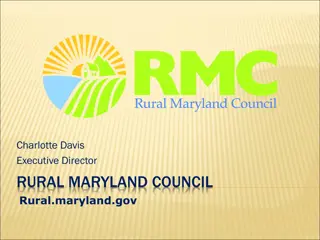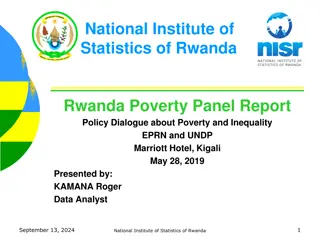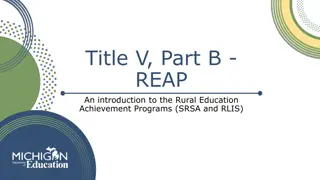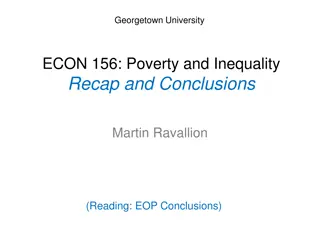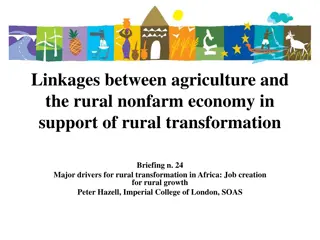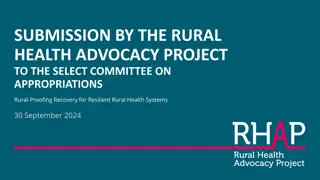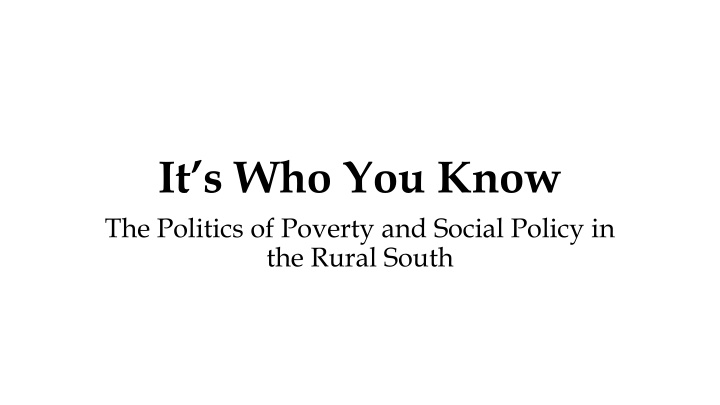
Politics of Poverty and Social Policy in the Rural South
This content delves into the intricate dynamics of poverty, racial disparities, and social policy implementation in rural southern communities. It explores the impact of economic restructuring, insular social networks, powerful resource-owning families, and rigid stratification on public welfare agencies and community well-being, focusing on North Carolina as a case study. The research question examines how rural features shape policy implementation and perpetuate social and economic disparities.
Download Presentation

Please find below an Image/Link to download the presentation.
The content on the website is provided AS IS for your information and personal use only. It may not be sold, licensed, or shared on other websites without obtaining consent from the author. If you encounter any issues during the download, it is possible that the publisher has removed the file from their server.
You are allowed to download the files provided on this website for personal or commercial use, subject to the condition that they are used lawfully. All files are the property of their respective owners.
The content on the website is provided AS IS for your information and personal use only. It may not be sold, licensed, or shared on other websites without obtaining consent from the author.
E N D
Presentation Transcript
Its Who You Know The Politics of Poverty and Social Policy in the Rural South
Racial Disparities Rural Sociologists have examine the causes and dimensions of rural poverty. Divestment of extractive industry Rise of Service Industry Decline in Manufacturing Racial Disparities in Poverty Racial Discrimination Role of strong ties and insular networks Political and economic power of resource owning families
Research Question To date, no study has examined how the features of rural southern communities shape policy implementation to reinforce disparities How do the distinct features of rural communities shape how public welfare agencies function in the rural south? How do these agencies alleviate or contribute to social and economic stratification?
Features of Rural Communities Rigid stratification Limited social mobility Insular social networks Economic opportunities depends on strong social ties, family reputation Everybody knows everybody Economic decline due restructuring Globalization and technology prompted decline in manufacturing/extractive industries Brain Drain Powerful families control resources Depends on region- could be tourism and hospitality, agriculture, extractive industry, or manufacturing
Why North Carolina? Poverty has not fallen to pre-recession levels NC poverty outpaces national poverty rate (NC: 14.7%, US: 12.3%) Wide racial disparities in poverty Most poverty concentrated in rural counties Decentralized social policy implementation NC one of 15 states that devolved administrative authority to county- level governments Counties responsible for a portion of administrative costs Vestiges of antebellum landed gentry dominate county government and economic development (Tomaskovic-Devey & Roscigno, 1997).
Granite County Granite County Poverty Rate by Race 33.70% 33.20% 29.60% 19.90% 14.00% Total pop. White Alone Black or African American Alone American Indian and Native Alaska alone Hispanic or Latino (of any race) Millsville is the county seat 8,000 residents
Method Mix of Organizational and Community Ethnography 3 counties over the course of five years Participant Observations (15 hours/week) 180 worker interviews 180 client interviews 100-120 community stakeholder interviews Community Leaders and Public Officials Historical Documents Administrative Data
Granites Social Order (N=65) White Landed Elite White Middle-Class Black Working Class Rural Poor Whites Rural Poor: African Americans, Latinos, and American Indians
Emerging Framework Landed Elite Economic Opportunities DSS
White Landed Elite: Nexus of Economic and Political Power The ones who have always thrived continue to thrive and the ones who have always struggled continue to struggle. You have certain families who have been in Millsville and those were also the families that were the plantation owners. There's also the families that had money back then, they just continued -- they helped their own old money...controls what comes in and what doesn t come in. And so it's that, that will hold the county back from growing. Medicaid Worker
Emerging Framework Landed Elite Economic Opportunities DSS
White Landed Elite: Constraining Economic Development It s not a lot of educated people here because of the fact that there's no jobs here. We had seven plants that closed down. I mean, half the people barely have a high school education. It's just no reason for people to live here. It's not a lot of room for growth. Our county commissioners and city council and all that stuff, it's still a very old fashioned, old way of thinking. It took forever for us to get Lowes because they didn't want to upset the guy who'd done the wood in the town because he's one of the money makers of this town. Medicaid Worker
White Landed Elite: Constraining Economic Development But there are no jobs here. Only thing here is -- it's a lot of family-owned businesses by white people. So they employ their family members. So be an outsider to try to get in, if you don t look like them, you're not getting a job. You're not going to get a job . Unless it's like fast food maybe. The chances are slim to none unless you know someone. Little Caesar's, McDonalds. Yeah. You can get a job like that but you're not going to get a job that can support you to live independently. Yeah. Those kind of jobs are not for black people Community Member
Emerging Framework Landed Elite Economic Opportunities DSS
White Landed Elite: Controlling DSS They will not change the taxing value. The commissioners won't -- you know, they have to vote on it. If they just do for one cent, right, well, what is that going to cost?...But I believe it's those who own 300 plus acres, 600 acres, and all this other stuff. It would affect them a whole lot. There's a lot of money in there. So yeah .You can not continue to operate without increasing the tax, but they just won t One of the commissioners, Commissioner Smith, I think he has a family farm, and I think that's kind of one of the influencers. DSS Director
Emerging Framework Landed Elite Economic Opportunities DSS
A Necessary Evil: DSS and the Low-wage Economy I had a conversation with a former commissioner and he said this to my face, he says, you know Albert he said, DSS is a necessary evil. And I just kind of looked at him but I was like, well, damn Well, what does that mean? We do about 10 million dollars a year in food stamps. Well, if you're on food stamps, more thank likely you're not going to Sam's or Costco in Durham to get your food stamp -- to get your food. You're going to do something here locally. So we're putting at least 10 million dollars into the local economy here, which is -- you know, we have two Food Lions, and Walmart -- super Walmart. Even IGA, little small community stores. $ 70 Million in Medicaid DSS Director
A Necessary Evil: DSS Employing Middle Class Elites In this community, in this county, if you're not working at the power plant, the school system, or any other type this kind of what everyone wants to go to, is DSS. So yeah. It is hard to get in here .people were looking for work. And they were looking for not just work, but stable work. DSS is not going anywhere. When the economy tanks, we're at our busiest. . Agency Supervisor
A Necessary Evil: DSS Employing Middle Class Elites It's a paycheck. And then they think about state retirement or government retirement. You know, I mean, I hear all of those type things, but not really, "I love my job. I can't wait to get to work." But it's like, "Well, this is a job. It pays my bills. I know if I retire, I have county government, a state government retirement. Agency Supervisor
Emerging Framework Landed Elite Economic Opportunities DSS
DSS: Employing Middle Class Elite, burdening the poor Because of scarce employment, most DSS workers gain entr e into the agency through their family and social networks DSS workforce not well trained, professional, or motivated to provide high quality services Corrective action State audits drain county resources
DSS: Employing Middle Class Elite, burdening the poor A lot of times it seems like they certain people are already picked to go into that position beforehand. It s just floored some of us totally because some people don't have any experience at all, and they'll automatically get certain positions that they don t, they've never even had any training in, for that job before. And I just don't see how that can happen. But that has happened anumber of times here. Its because of who they know, who they're related to, and they could have known them, they grew up here, known them for a long time Adult Services Worker
Consequences: Rural Poor Exclusion from Economic Opportunity Administrative Burden Stigmatizing interactions with workers (given social divides) High Compliance costs (resubmitting paper work) because of worker mistakes and poor case-management Discontinuity in services Delayed benefits if any at all Greater hardships
Granites Social Order Landed Elites control job opportunities and DSS resources White Landed Elite DSS maintains Granite County s social order DSS Employment White Middle-Class Black Working Class Low-Wage Employment Rural Poor Whites Tenuous Public Assistance Rural Poor: African Americans, Latinos, and American Indians
Racial Disparities and Decentralized Policy Implementation Disparities driven by decentralization in policy administration Generosity and accessibility of programs vary by political ideology, racial composition, and state resources. Regions with the highest concentration of poor Blacks are among those that are most impoverished. Conservative political ideology and limited state funding lead to punitive, paltry, and inaccessible programs (Soss et al., 2011; Campbell, 2014; Michener, 2018).
Sample Staff and Community Interviews (n=65) Age 45 Race White African American Hispanic/ Latino Native American 63% 30% 5% 2% Gender Women Men 97% 3%
White Landed Elite: Controlling DSS State led, county administered programs Cost sharing agreements for most means-tested programs. Local white elites control county board of commissioners who serve on DSS board, determine DSS budget, and tax rates. White elites resist tax raises that would raise revenue for social services in Granite
Key Take-aways Landed elites shape social policy implementation Control job opportunities Influencing the demand for public assistance Shaping demand for DSS employment Control DSS Determining DSS budget Work conditions of bureaucrats DSS maintains Granite County s social order Provides employment opportunities to middle and bottom strata when landed elites are reluctant to do so. Infuses revenue into the local economy Supporting the retail and service industry Poor policy implementation keeps rural poor in economic hardship
Next Steps Two other counties (data collection in Progress) 1 rural coastal plain county out east 1 urban piedmont county Selected to vary on rurality, racial composition, poverty rates, diversity of local economy Typology of rural counties Three more counties out east Identify conditions under which DSS is captured by landed elite Contextual range of theory- does it have legs in other rural Southern states?
Method Interpretive Method (Haverland and Yanow, 2012) Social Stratification Theory Elites accumulate political power and economic resources) Street Level Bureaucracy Bureaucratic discretion shaped by working conditions ( e.g., resources, time, training) and by workers social identities Administrative Burdens Citizens face burdens in accessing benefits that can lead to economic hardship Abductive Deductive and Inductive Iterative Process You re apart of my process!
Why North Carolina? Poverty has not fallen to pre-recession levels NC poverty outpaces national poverty rate (NC: 14.7%, US: 12.3%) Wide racial disparities in poverty Most poverty concentrated in rural counties Decentralized social policy implementation NC one of 15 states that devolved administrative authority to county- level governments Counties responsible for a portion of administrative costs Vestiges of antebellum landed gentry dominate county government and economic development (Tomaskovic-Devey & Roscigno, 1997).
Key Take-aways Landed elites shape social policy implementation Control job opportunities Control DSS DSS maintains Granite County s social order Employs middle and bottom strata when landed elites are reluctant to do so. Infuses revenue into the local economy Supporting the retail and service industry Poor policy implementation keeps rural poor in economic hardship











